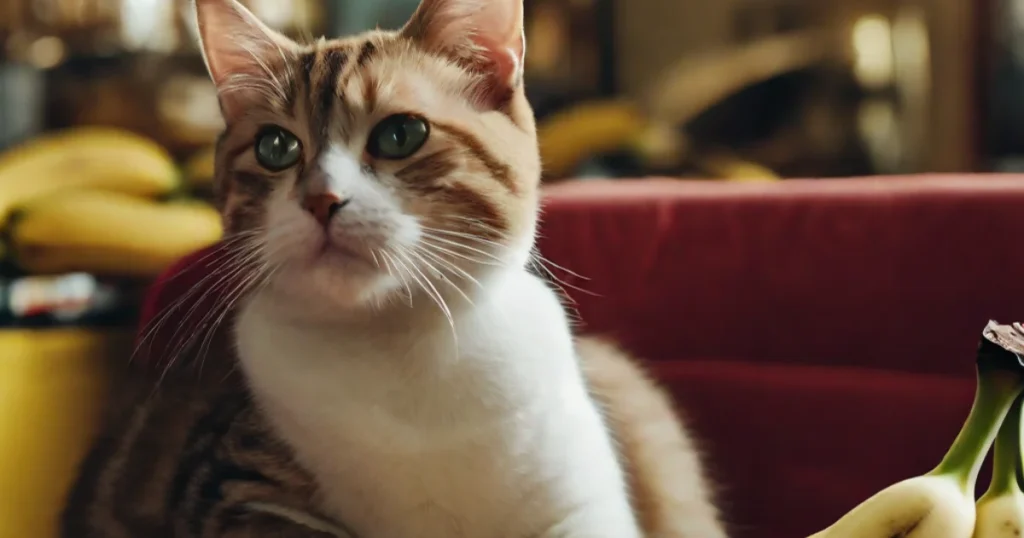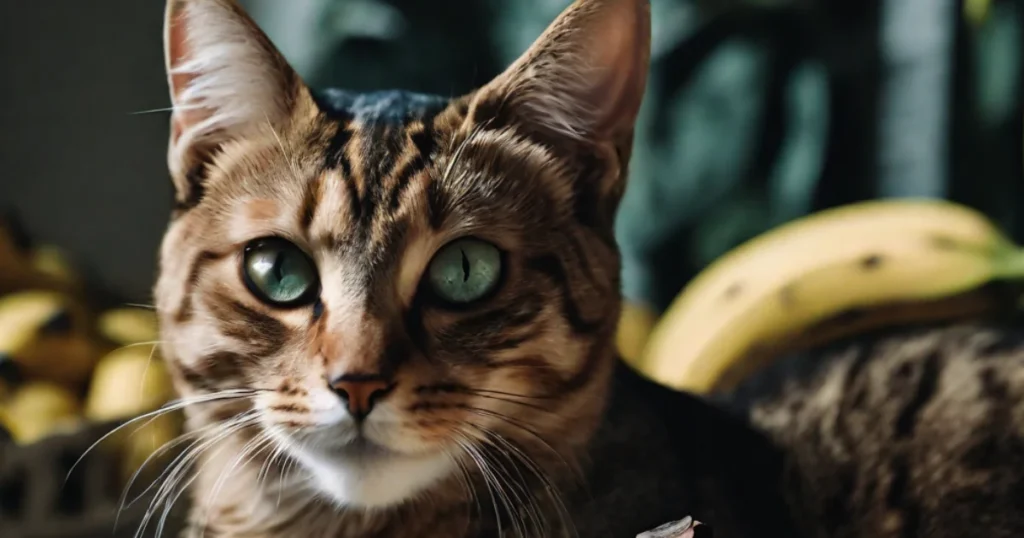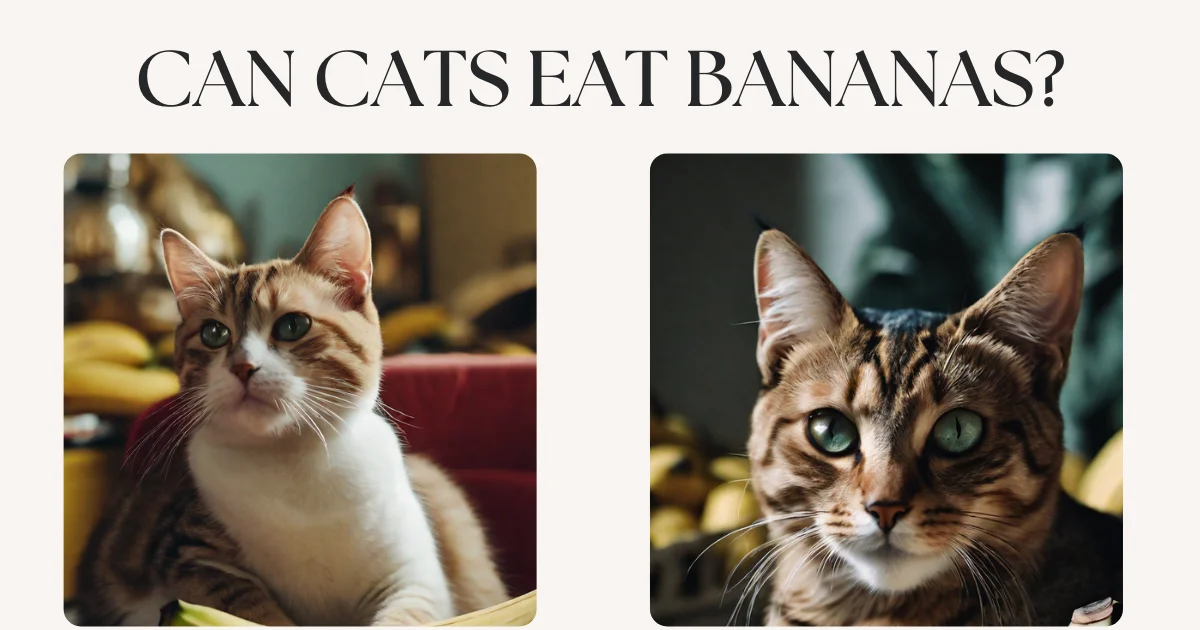Many cat owners are constantly looking for new and healthy treats to feed their feline friends. And with the recent trend of incorporating more fruits and vegetables into pet diets, the question arises – can cats eat bananas? As a cat owner and lover myself, I was also curious about this. So, I did some research and consulted with experts to bring you the lowdown on feeding bananas to your furry friend. Read on to find out if your crazy cat can also be a clever cuisine with this popular human snack.

Table of Contents
To Banana or Not to Banana? Unveiling the Debate
Cat owners everywhere are divided on the topic of feeding their feline friends bananas. Some believe that cats can safely enjoy this popular human snack, while others argue that it is best to steer clear. So, what’s the verdict?
The debate surrounding cats and bananas primarily stems from concerns about their digestive systems and dietary needs. Cats are obligate carnivores, meaning that their bodies are designed to derive the necessary nutrients from a meat-based diet. This raises questions about whether or not cats can digest and benefit from the nutrients found in bananas.
One argument in favor of feeding cats bananas is that they are a good source of essential vitamins and minerals, such as potassium and vitamin C. These nutrients can contribute to overall health and support various bodily functions. Additionally, bananas are often touted for their high fiber content, which may aid in digestion and promote a healthy gut.
On the other hand, opponents of feeding cats bananas point out that these fruits contain relatively high amounts of sugar. Cats, unlike humans, do not possess the taste receptors necessary to detect sweetness. This raises concerns about their ability to metabolize and process the sugars found in bananas. Furthermore, the high carbohydrate content of bananas may not align with a cat’s dietary requirements, potentially leading to weight gain or other health issues.
Ultimately, the decision to feed your cat bananas should be made with caution and consideration for your individual feline’s needs. It is always advisable to consult with a veterinarian before introducing any new foods into your cat’s diet. In the next section, we will explore the nutritional composition of bananas to gain a better understanding of their potential benefits and risks for our furry friends.

Breaking Down the Nutritional Composition of Bananas
Bananas are a delicious and nutritious fruit that many humans enjoy regularly. But what about our furry feline friends? Let’s break down the nutritional composition of bananas to see if they can be a healthy addition to your cat’s diet.
First and foremost, bananas are rich in potassium. This essential mineral plays a vital role in maintaining proper muscle function and promoting heart health. Additionally, bananas contain significant amounts of vitamin C, which can boost the immune system and promote healthy skin and coat for your cat.
Another important nutrient found in bananas is dietary fiber. Fiber is crucial for maintaining a healthy digestive system and preventing constipation in cats. It can also aid in weight management by promoting a feeling of fullness and preventing overeating.
On the downside, bananas do contain natural sugars. While cats lack the taste receptors to detect sweetness, it is important to note that too much sugar can lead to weight gain and potentially cause other health issues in cats.
Can Cats Have Bananas? The Possible Health Benefits of Bananas
While the debate surrounding cats and bananas continues, there are potential health benefits to consider. Bananas are packed with essential vitamins and minerals that can contribute to your cat’s overall well-being. One of the key nutrients found in bananas is potassium, which plays a vital role in maintaining proper muscle function and promoting heart health. This is especially important for cats, as heart disease is a common concern among felines.
In addition to potassium, bananas also contain significant amounts of vitamin C. This powerful antioxidant can boost your cat’s immune system and promote healthy skin and a shiny coat. As we all know, a healthy cat is a happy cat!
Furthermore, the dietary fiber found in bananas can be beneficial for your cat’s digestive system. Fiber helps maintain regular bowel movements and can prevent constipation in cats. It also aids in weight management by promoting a feeling of fullness and preventing overeating.
However, it’s important to remember that moderation is key. Too much of anything, even a healthy fruit like bananas, can have negative consequences. Always consult with your veterinarian to determine the appropriate portion size and frequency of banana consumption for your specific cat.
In the next section, we will delve into the potential risks and side effects of feeding your cat bananas, so stay tuned for more information.

Risks and Potential Side Effects of Feeding Your Cat Bananas
Feeding your cat bananas may come with some risks and potential side effects that every cat owner should be aware of. While bananas can provide certain nutritional benefits, it’s important to consider the potential drawbacks as well.
One risk of feeding your cat bananas is the high sugar content. While cats don’t possess taste receptors for sweetness, too much sugar can still be detrimental to their health. Excessive sugar consumption can lead to weight gain, diabetes, and other health issues in cats. It’s crucial to monitor your cat’s overall sugar intake and ensure it is within a healthy range.
Additionally, cats may have difficulty digesting bananas due to their unique digestive systems. Cats are obligate carnivores, meaning their bodies are designed to process and obtain nutrients from a meat-based diet. The high carbohydrate content of bananas may not align with their dietary needs and could potentially lead to digestive upset or gastrointestinal issues.
Another potential side effect of feeding your cat bananas is the risk of allergies. Some cats may have sensitivities or allergies to bananas, which can manifest as digestive issues, skin irritation, or respiratory problems. It’s essential to observe your cat’s reaction to bananas and discontinue feeding them if any adverse symptoms occur.
Overall, while bananas can offer certain nutritional benefits, it’s crucial to exercise caution and moderation when incorporating them into your cat’s diet. Consult with your veterinarian to determine the appropriate portion size and frequency of banana consumption for your cat to ensure their health and well-being.
Serving Suggestions: Fun Ways to Safely Incorporate Bananas in Your Cat’s Diet
If you’ve decided to give your cat bananas, there are some fun and safe ways to incorporate them into their diet. Here are a few serving suggestions to make this fruit more appealing to your feline friend:
1. Frozen banana treats: Cut a ripe banana into small pieces and freeze them. Once frozen, offer them as a refreshing treat on a hot day. The cold texture can be especially enticing for your cat.
2. Banana mash: Mash a small portion of ripe banana and mix it with your cat’s regular wet food. This can add a hint of flavor and nutrition to their meal while keeping it balanced.
3. Banana toys: Stuff a hollow, cat-safe toy with mashed banana and freeze it. This not only provides entertainment but also offers a tasty reward for your cat’s playful efforts.
4. Banana puree: Blend a ripe banana with a little water or unsweetened coconut milk to create a smooth puree. Use this as a drizzle over your cat’s food to enhance the taste and encourage them to eat.
5. Banana slices as toppings: Simply slice a ripe banana and use it as a decorative topping on your cat’s food. It adds a touch of color and a subtle fruity aroma that can entice them to dig in.
Remember, these serving suggestions should be done in moderation and tailored to your cat’s specific dietary needs. It’s always a good idea to consult with your veterinarian before making any changes to your cat’s diet. So go ahead, have fun, and experiment with these ideas to make bananas a delicious and healthy addition to your cat’s menu.
When Bananas Aren’t a Hit: Understanding Feline Food Preferences and Alternatives
Cats are notorious for being picky eaters. Just because bananas are safe for them to eat doesn’t necessarily mean that they’ll enjoy them. If your furry friend turns up their nose at the sight of a banana, don’t worry – it’s completely normal.
Feline food preferences are influenced by a variety of factors, including their instincts, personal tastes, and past experiences. Cats are obligate carnivores, meaning that they rely on a meat-based diet to meet their nutritional needs. Their taste buds are specifically attuned to detect the flavors and textures of prey animals, making them less likely to be interested in fruits like bananas.
If your cat isn’t a fan of bananas, there are plenty of other healthy alternatives that you can offer. Some popular options include cooked chicken, turkey, or fish, which provide essential protein and nutrients. You can also try offering small amounts of cooked vegetables like carrots or peas, which can provide additional vitamins and fiber.
Remember, it’s important to consult with your veterinarian before making any major changes to your cat’s diet. They can provide personalized recommendations based on your cat’s specific dietary needs and preferences. By understanding your cat’s unique tastes and providing them with a variety of options, you can ensure that they receive a balanced and enjoyable diet.
Expert’s Advice: What Veterinarians Say about Cats and Bananas
When it comes to the question of whether cats can eat bananas, it’s always best to consult with a veterinarian. They have the knowledge and expertise to provide you with the most accurate and up-to-date advice regarding your cat’s dietary needs. So, what do veterinarians have to say about cats and bananas?
While opinions may vary slightly, most veterinarians agree that cats can safely consume small amounts of bananas as an occasional treat. They emphasize the importance of moderation, as cats have unique dietary requirements that are best met through a balanced and appropriate diet. Bananas should never replace the main source of nutrition in a cat’s diet, which should primarily consist of high-quality cat food.
Veterinarians also caution against feeding cats bananas in large quantities or as a regular part of their diet. The high sugar content in bananas can potentially lead to weight gain and other health issues in cats. Additionally, some cats may have allergies or sensitivities to bananas, so it’s essential to monitor their reaction and discontinue feeding if any adverse symptoms occur.
Ultimately, veterinarians stress the importance of individualized care for each cat. They recommend discussing any changes to your cat’s diet, including the introduction of bananas, with a veterinarian. They can provide personalized guidance based on your cat’s specific needs and ensure their health and well-being.
Conclusion
After diving into the world of cats and bananas, it’s clear that there is no one-size-fits-all answer to whether cats can eat bananas. The debate surrounding this popular human snack continues to divide cat owners and experts alike. While bananas can offer certain nutritional benefits, there are also potential risks and side effects to consider.
Ultimately, the decision to feed your cat bananas should be made with caution and consideration for your individual feline’s needs. It’s crucial to consult with a veterinarian before introducing any new foods into your cat’s diet. They can provide personalized guidance based on your cat’s specific dietary requirements and help you navigate the potential benefits and risks of feeding them bananas.
If you do decide to give your cat bananas, it’s important to do so in moderation. Too much of anything, even a healthy fruit, can have negative consequences for your furry friend. Pay attention to their overall sugar intake and observe their reaction to bananas for any adverse symptoms.
Remember, cats are obligate carnivores, and their bodies are designed to derive the necessary nutrients from a meat-based diet. While bananas can provide certain vitamins and minerals, they should never replace the main source of nutrition in a cat’s diet.
In conclusion, bananas can be safely fed to cats in small amounts as an occasional treat, but it’s always best to consult with a veterinarian and prioritize a balanced and appropriate diet for your feline friend.
FAQs
Q: Is it safe for cats to eat bananas?
A: Yes, bananas are generally safe for cats to eat in small amounts. They are non-toxic to cats and can be a healthy occasional treat. However, bananas should be given in moderation as part of a balanced diet, and it’s important to remove the peel before offering them to your cat.
Q: Are any fruits toxic to cats?
A: Yes, some fruits can be toxic to cats. Certain fruits, such as grapes, raisins, and cherries, can be harmful and should be avoided. Additionally, citrus fruits like oranges and lemons may cause digestive upset in some cats. It’s always best to research and consult with a veterinarian before introducing any new fruits to your cat’s diet.
Q: Why do cats like to lick bananas?
A: Cats may be attracted to the scent or taste of bananas, prompting them to lick or show interest in them. However, each cat’s preference may vary. Some cats may simply enjoy the texture or find the smell intriguing. It’s important to remember that not all cats are interested in bananas, and individual preferences can differ.
Q: Can a cat eat watermelon?
A: Yes, cats can eat watermelon in small amounts. Watermelon is non-toxic to cats and can provide hydration due to its high water content. However, it’s important to remove the seeds and rind before offering watermelon to your cat. It’s also crucial to introduce new foods gradually and observe your cat’s reaction.

